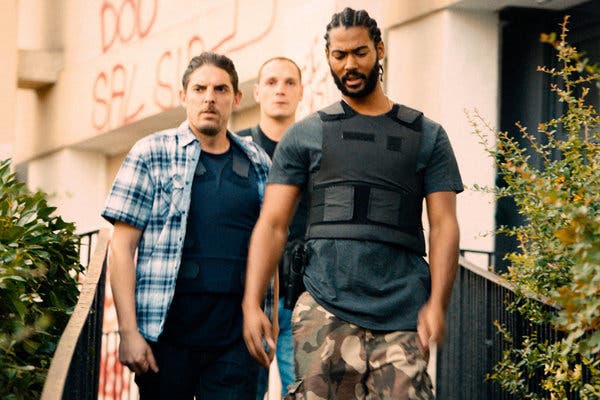Ly’s brilliant choice to show what a unified and equitable France could look like contrasts with the Wire-esque depiction of the Montfermeil community. The cops are represented by a trio of foot soldiers: aggressive Chris (Alexis Manenti), close comrade and Montfermeil native Gwada (Djebril Zonga), and Stephane (Damien Bonnard), transplanted from a quieter rural district. The area’s factions, among others, are led in one camp by the self-styled Mayor (Steve Tientcheu) and in another by Zorro (Raymond Lopez), the latter of which runs a rickety carnival. A stoic restauranteur, Salah (Almamy Kanoute), sells Islam with his kebabs, and a gaggle of kids runs in between and away from all these groups. These adolescents, shown celebrating in the opening scenes, include Issa (Issa Perica) and tech-savvy Buzz (Al-Hassan Ly). Within these power centers are alliances and subterfuges, especially from the Mayor who both courts the police and looks for ways to undermine them. He’s given the chance when Issa steals a lion cub from Zorro, and the Mayor puts the police on the kids as a way to keep the neighborhood from breaking into conflict. Gwada badly injures Issa in the chase, and Buzz manages to record the interaction. The entire banlieue recognizes that the footage is extremely valuable and all parties converge on a memory card that can upset the balance of power.
With a large cast of characters, Ly doesn’t have time to fully flesh them all out with long scenes or turn a dozen-plus roles into dense and knowable people. What he does instead is draw naturalistic performances out of his actors that suggest a deeper life. Chris’ relative shortness and his hair-trigger temper imply a lifetime of dick-measuring bravado. Salah’s patience and poise makes him a natural refuge for the younger characters, and he generates a lot of sympathy around the choices that circumstances force him to make. In keeping with the characters’ ability to quickly make an impression, Ly gets the broad strokes right on each faction, such that each feels true despite recognizing the storytelling shorthand (new cop on the beat, especially). The cops are instantly recognizable as bullies who embody all the criticism that adversarial policing has been generating for years, and the kids are waking up to the shortening amount of latitude they’re going to be granted as they age, in addition to the fallibility of the adults around them.
Les Miserables ultimately explodes into a revolution and joins other urban unrest films like Do the Right Thing in the moral quandary it leaves the viewer in. The decay of civil order is always a chilling thing when filmed as powerfully as it is here, and Ly allows the viewer to have an understanding of the value of the world being burned down to those doing the burning. He also gets that every revolution comes down to the moment when one party either lowers their weapons or fires them, choosing solidarity or domination. History zeroes in on individuals making their own choices from a base of everything that came before in their lives. Les Miserables finds that personal history and places it alongside all the things that have to happen for the final two characters to face each other as they do. Ly ends Les Miserables with text from Hugo’s novel, asserting that there are no bad plants, only bad cultivators. Ly would include all parties in the cultivator role, from the state on down, and he makes a strong case for it, and for himself as an evocative and socially conscious filmmaker. A-

 RSS Feed
RSS Feed